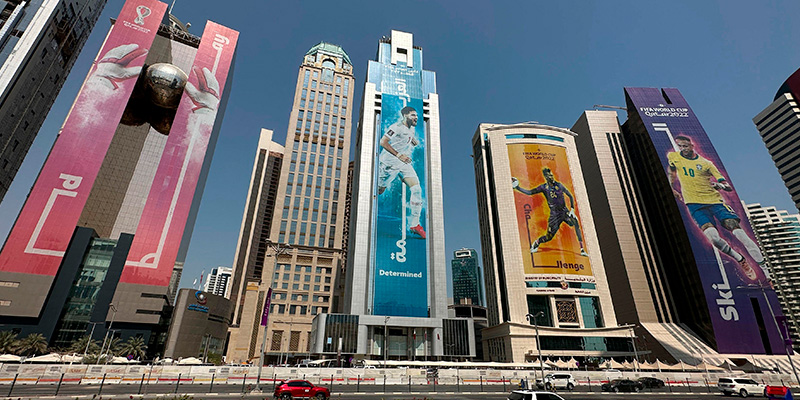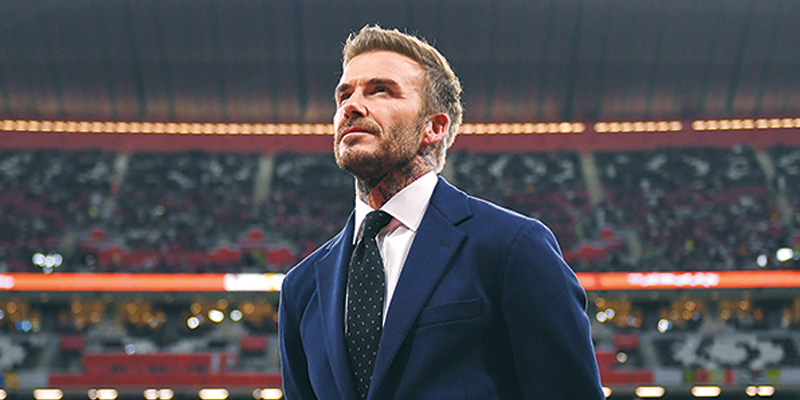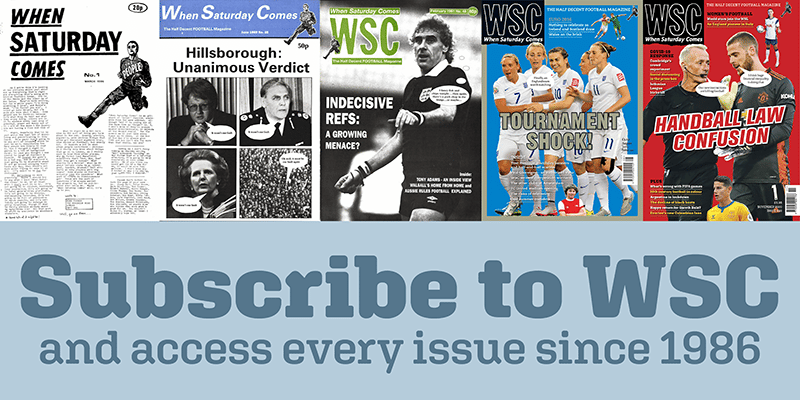
World Cup 2022 branding and images of players are seen on buildings in Doha, Qatar. Alamy
Qatar’s flawed bid should have been thrown out but officials shunned human rights concerns in favour of riches that will never reach those who need them most
14 November 2022
In 2017 leaked emails revealed that David Beckham was greatly upset at being overlooked for the knighthood he felt he deserved for his charity work. Five years on his role as an ambassador for the 2022 World Cup might yet help him to bag a title. Beckham, who with his wife Victoria has an estimated net worth of £400 million, is being paid up £15m a year to promote tourism in Qatar. An ability to blankly recite a script while wandering around a food market should not usually be a guarantee of major honours. But anyone who can help the UK government to expand its already friendly relationship with Qatar might reasonably expect to be in line for a reward.
At the Conservative party conference on October 6, Liz Truss had Russia in mind when she told her audience that the UK had become “too dependent on authoritarian regimes for cheap energy”. It then emerged that British energy minsters had spoken to their Qatari counterparts the previous day about increasing gas imports. How an absolute monarchy does not fit the description of an authoritarian regime is unclear.
Nonetheless, we can expect plenty of positive coverage of the world’s third largest gas exporter in the UK press during the forthcoming World Cup. Though this should at least be offset, you would hope, by further investigations into the treatment of migrant workers in the kingdom. As the tournament approaches, the Qataris have stepped up their efforts to dispute the death tolls among workers, mainly from south Asia, since the World Cup was awarded in 2010. International labour organisations have set the total at over 6,000. Combined figures from the workers’ own countries suggest that it may be much higher.
Eleven of the 22 FIFA executives who took part in the awarding of the World Cup to Qatar in December 2010, when the US was beaten in the final run-off by 14 votes to eight, were eventually subject to punitive actions including life bans from football. Some committee members might have been won over by the Qataris’ claim during the bidding process that games would be staged in stadiums equipped with revolutionary cooling technology. These plans were scrapped after the vote. Once it was established, a little over three years later, that a country where July temperatures average 41 degrees could not stage a summer tournament, there was widespread talk of running the vote again.

David Beckham, being paid £15 million a year to promote tourism in Qatar, at the 2021 Arab Cup final in the country. Getty Images
That failed to materialise along with the legal action against FIFA threatened by the other four bidders. The prospect that some countries might refuse to take part in the qualifying competition also came to nothing, as did the belief that some prominent footballers might decline to play. Lionel Messi was among those lobbied by human rights groups in this regard. But any lingering hopes that he might drop out, and would influence others to follow, disappeared when he signed for the Qatari-owned Paris Saint-Germain in the summer of 2021; he has since become a brand ambassador for Saudi Arabia.
There have been gestures of protest, mostly in Scandinavia: Denmark’s kit manufacturers Hummel recently released a modified version of the national team shirt with their branding reduced to a minimum and an all-black change kit, which they describe as “the colour of mourning”. Opposition will also come from those football supporters around the world – some WSC readers may be among them – who have decided to pay no attention to the tournament.
In the build-up to this World Cup there has been a distinct sense that it represents an unrepeatable low point for football, that once the final is played on December 18, there will be a return to whatever normality is judged to be. But rivalries among the Gulf states are now being played out in part through their huge investments in sport, either as event hosts or as owners of teams, including several football clubs in Europe.
While Russian oligarchs have been frozen out of English football over their connections to Vladimir Putin’s regime, there is nothing to stop the middle eastern oil monarchies from continuing to pursue an interest in UK clubs. The Qataris have not yet bought their way into English football, but it seems unlikely that obstacles would be placed in their way. David Beckham might yet be asked to make some introductions.
This article first appeared in WSC 426, November/December 2022. Subscribers get free access to the complete WSC digital archive
Want to see your writing published in WSC? Take a look at our pitching guide and get in touch
Tags: 2022 World Cup, David Beckham, FIFA, Qatar
